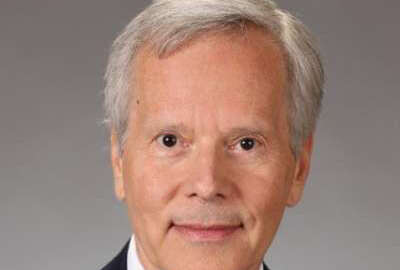
Cabinet leaders are in, now for the sub-cabinet appointments
Contractors are looking to see who will fill crucial sub-cabinet appointment slots. The latest from Professional Services Council president and CEO David Berteau.
Best listening experience is on Chrome, Firefox or Safari. Subscribe to Federal Drive’s daily audio interviews on Apple Podcasts or PodcastOne.
The executive orders frenzy has tailed off. We know what the Biden administration wants for pandemic relief. But what next? Contractors are looking to see who will fill the crucial sub-cabinet appointment slots and how 2022 budgets will play out. With the latest, the president and CEO of the Professional Services Council, David Berteau, joined Federal Drive with Tom Temin.
Interview transcript:
Tom Temin: David, what I wanted to start with was the idea of this $15 minimum wage, because there are people at that level in some services contracts, and if those contracts are at a fixed rate, what happens? I imagine your members are thinking about that.
David Berteau: Tom, it’s a powerful dynamic that comes into play, but it doesn’t affect all companies equally. As you know, in the services contract business, there’s a lot of competition for top talent. And so, for many companies and for many contracts, the base rate of pay as well above the $15 an hour minimum. But there are other contracts and other types of work where in fact the companies have bid and are performing contracts often in a fixed price contract environment with much lower rates. And so it doesn’t affect companies equally and it doesn’t affect parts of the country and types of work equally. What many companies are worried about though is if there is a mandate for me to pay my employees more, how do I recover those costs if I have bids in that are at lower rates, if I have forward pricing rate agreements for my overhead structure that have lower rates built in, or if I have a fixed price contract where the government doesn’t have any flexibility to pay me my increased costs? So these are questions not addressed yet by the administration, and we’re raising those on behalf of our members.
Tom Temin: Of course, it’s not reality yet, and the president says he wants it to happen over a period of time, but it’s really a kind of a wild card at this point, I guess, on the political front.
David Berteau: Look, I think almost all of us would like to make sure we are paying our employees a living wage. And so that’s not the issue. The issue is, if companies have to absorb those increased costs, and they have no way to get reimbursed for them, they’ll be put out of business. And similarly with paid leave, with increases in paid leave, if you don’t get your costs recovered. The nature of government contracting is in fact the government bases its judgments on you on your cost realism. And you have to get your costs recovered according to the standards that are in place, the cost accounting standards that the government applies.
Tom Temin: Alright, and let’s move to another issue, since we can’t resolve that one until they decide what the wage will be. Of course, it’s gonna make a lot of automated hamburger flipping machines come into the industry I think if they do go to that wage,. And sub Cabinet nominees, deputy assistant secretaries, under secretaries, all of the people that are really the wheels were the road of policy touches the administration, you’re kind of waiting on some of them too, well we haven’t seen that bumper crop coming in yet.
David Berteau: We got off to a slow start with Cabinet nominees in part because of the hiccups in the transition period. And in part because the United States Senate only last week reached agreement on the power sharing agreement that would allow committees to actually know who their chairs were and subcommittees to know who their chairs were, etc. You had the interesting phenomenon of the nominee to be the number two person at the Pentagon, Dr. Kathleen Hicks. She had her hearing on Tuesday and the Republican Chair of the Armed Service Committee was still chairing it — by Thursday, when they brought it up, the Democratic chair was now chairing the committee. Now in Armed Services, there’s always a lot of bipartisan approach to national security, so that’s not so hard. But you’re behind in terms of doing this. And as you point out, it’s the number two’s in the agencies who are frequently running the internal business, the cabinet officers, the external face of the agency, and oftentimes the policy setter, but it’s the implementation and the execution that comes into play. For many agencies, we haven’t even seen the official nominees announced yet, much less have their nominations submitted and their hearings underway. So we’re gonna watch that very closely. Of course, we encourage the administration to fill those billets quickly, because they’ve got a fiscal year 22 budget to put together.
Tom Temin: Let’s talk about that, that 2022 budget, because I guess we’re waiting for a skinny proposal from the White House, first of all, to see what happens with how they want to change things — but Congress shows no inclination to really get started on anything anyhow.
David Berteau: Tom, we have three different dynamics at work there that make this complicated. Number one is the outgoing administration did assemble proposed budgets for FY 22 but they did not submit them to Congress. And so those budgets, we haven’t seen them, we don’t know what what’s in them. We’ve had reports that the defense budget was about a $12 billion increase over FY 21 appropriations. And we would expect that the civilian agency budgets as the Trump administration had done for five previous consecutive years, was well below the appropriation level. Probably neither of those is going to be what the Biden administration submits, but you have to redo them in order to submit them, and to redo them, you’ve got to have the people in place to be able to get that going. We don’t even have a Director of the Office of Management Budget. She hasn’t had a confirmation hearing, I think it’s today. And on top of that, we don’t have any agreement between Capitol Hill and the administration over what the numbers are going to be. And this is unusual, because for the past 10 years, we’ve lived with these budget caps, which also had become the target or the floor, right. Because ultimately, Congress appropriated to the caps level. We don’t have a cap, we also don’t have a floor. And so the question of what number will you submit, that would be fine if we didn’t have the time pressure on us, which is the third element that comes into play. Not only are we already into February, and so we’ve only got seven and a half months left in the fiscal year — but on August 1, we have a return of the debt ceiling. And debt ceilings are often postponed by the Treasury Department’s extraordinary measures, but nobody has a good track record of what extraordinary measures look like when we’ve got $3 trillion a year deficit spending. And so it may be that the Treasury Department can’t buy that much time. So there’s a lot of time pressure at the back end on the Congress, and time pressure at the front end, because there’s nothing submitted. This is really important to contractors, because people tend to, programs tend to slow down their obligation, if they don’t know how much money they’re getting next year, or when they’re going to get it. And so we’re watching those obligation rates in the award of new contracts very closely.
Tom Temin: Yeah, the real nitty gritty of governing yet I think hasn’t quite sunk in to the new team yet.
David Berteau: It takes a while to get your feet on the ground.
Tom Temin: And a final question. What about vaccinations of contractor personnel? What’s your sense of how the industry is going there? Because I haven’t heard of any state, I was just corresponding with a cousin in Washington State, who says it’s as much a mess out there as it is in the Delmarva area and New York and everywhere else we’ve heard about.
David Berteau: Right, even the best performing states don’t have a lot of their citizens vaccinated yet. And the question that you have for contractors is, who’s an essential worker. Back at the beginning of the pandemic we had a memorandum coming out of the Department of Homeland Security’s Center for Infrastructure Security Agency, CISA, had put out memorandums identifying that most government contractors would be essential workers and agencies like the Defense Department put out supplemental memos to do that. They’ve done similar activities this time, but it doesn’t do you a lot of good to be next in line at your state level or your county level if the line is so long that you don’t know when you’re going to get to it. Vaccinating essential workers is obviously critical to having them be able to do their work, especially if they’re not isolated at home and teleworking. And a huge chunk of the services contractors do have work that has to be done with touch labor or unclassified facilities or in laboratories or somewhere where you can’t do it remotely. So this is a critical issue of how are we going to get those essential workers vaccinate.
Tom Temin: Alright, well, the same question I guess every American has, it makes the toilet paper shortage seem like a picnic.
David Berteau: I don’t know about that. But it certainly makes it an important issue and one that we’ve got to get our arms around better.
Tom Temin: David Berteau is president and CEO of the Professional Services Council. As always, thanks so much.
David Berteau: You’re welcome Tom.
Copyright © 2025 Federal News Network. All rights reserved. This website is not intended for users located within the European Economic Area.
Tom Temin is host of the Federal Drive and has been providing insight on federal technology and management issues for more than 30 years.
Follow @tteminWFED
Related Stories

CMMC: ‘Changing culture one company at a time’




